#mount teide
Explore tagged Tumblr posts
Text

"Lunar landscape" on the southern slope of Mount Teide, Tenerife, 1933. From the Budapest Municipal Photography Company archive.
205 notes
·
View notes
Text



10 notes
·
View notes
Text

Mount Teide volcano in Tenerife, Canary islands, Spain
Spanish vintage postcard
#tarjeta#postkaart#sepia#tenerife#spain#spanish#carte postale#ansichtskarte#volcano#canary#briefkaart#photo#photography#postal#postkarte#vintage#islands#mount#teide#postcard#historic#mount teide#ephemera
8 notes
·
View notes
Text
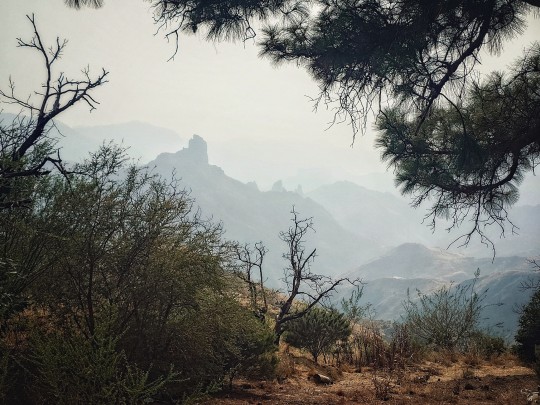
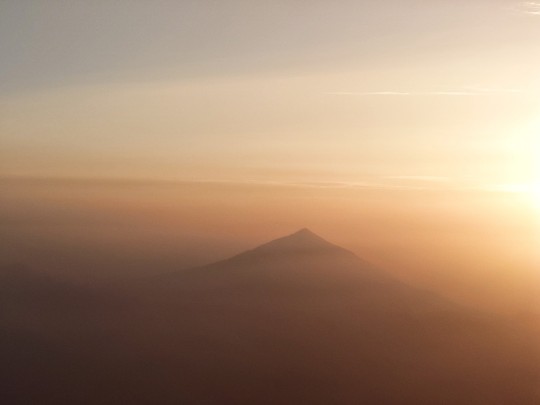
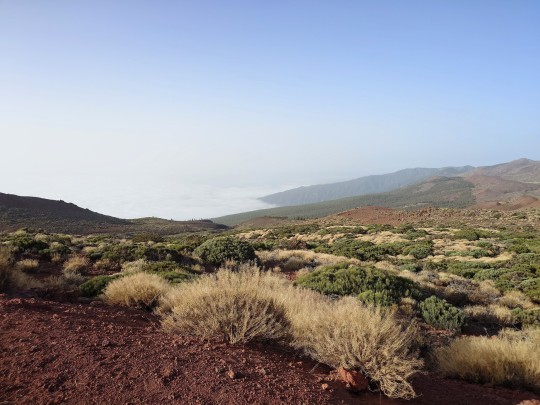
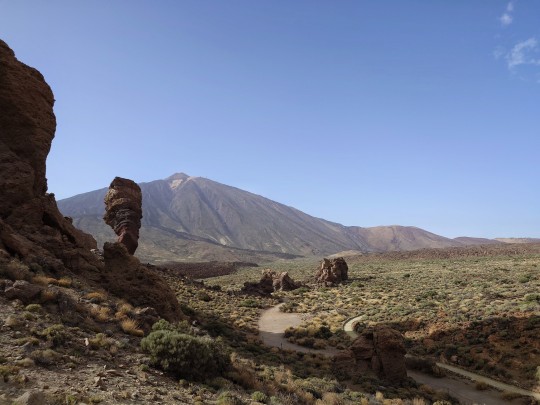
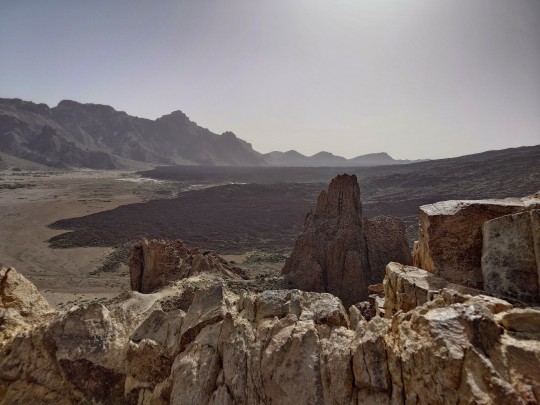
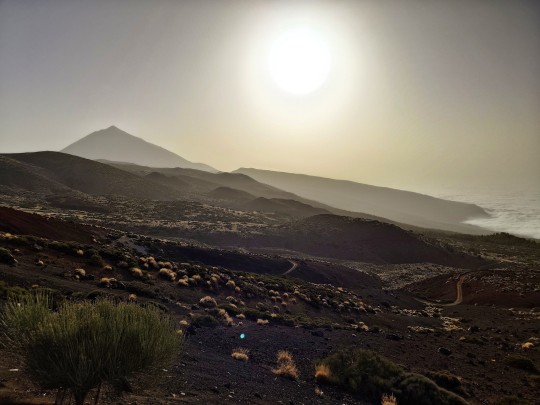
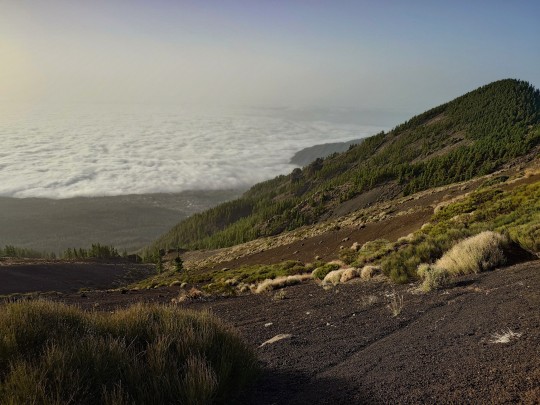

9 notes
·
View notes
Photo

Tenerife
El Teide.
Mount Teide.
Berg Teide.
Le Teide.
2 notes
·
View notes
Text

Mount Teide, Tenerife. Credits: Ismael Zuaznabar
0 notes
Text

Mount Teide (Volcano), Canary Islands, Spain.
0 notes
Text


Mount Teide bugloss in winter form.
#Mount Teide bugloss#flowers#nature#photography#patterns ni nature#a game of tones#flora#floral#teide#teide national park#tenerife#gran canaria#canary islands#original photographers#photographers on tumblr#lensblr#original photography#pws
43 notes
·
View notes
Text

Echium wildpretii, also known as Tower of jewels 😮
Echium wildpretii is a species of flowering plant in the family Boraginaceae, endemic to the Canary Islands, Spanish archipelago. It mainly grows in the subalpine zone of the ravines of Mount Teide, a volcano on Tenerife island. The common names are tower of jewels, red bugloss, Tenerife bugloss or Mount Teide bugloss.
It is a herbaceous biennial plant that reaches between 1–3 m (3 ft 3 in – 9 ft 10 in) in height, with an erect inflorescence that bears red flowers. The plant produces a dense rosette of leaves during the first year, flowers in the second year, and then dies. It blooms from late spring to early summer in Tenerife.
📷 Julian Quintero
954 notes
·
View notes
Photo

A postcard from Tenerife, Spain dated December 1895 with an illustration of Mount Teide. Contains the text "Mr & Mrs Charles H. Hamilton wish you a very Happy New Year".
#holiday#Christmas#xmas#Thanksgiving#New Year#weird#vintage#retro#postcard#card#cards#postcards#ephemera#boo
12 notes
·
View notes
Video
youtube
2023 December 3
Moon Setting Behind Teide Volcano Video Credit & Copyright: Daniel López (El Cielo de Canarias); Music: Piano della Moon (Dan Silva)
Explanation: These people are not in danger. What is coming down from the left is just the Moon, far in the distance. Luna appears so large here because she is being photographed through a telescopic lens. What is moving is mostly the Earth, whose spin causes the Moon to slowly disappear behind Mount Teide, a volcano in the Canary Islands off the northwest coast of Africa. The people pictured are 16 kilometers away and many are facing the camera because they are watching the Sun rise behind the photographer. It is not a coincidence that a full moon rises just when the Sun sets because the Sun is always on the opposite side of the sky from a full moon. The featured video was made in 2018 during the full Milk Moon. The video is not time-lapse -- this was really how fast the Moon was setting.
∞ Source: apod.nasa.gov/apod/ap231203.html
60 notes
·
View notes
Text

Comet Hyakutake and a Tree - April 10th, 1996.
"Comet Hyakutake was still visible as it continued its orbit around the Sun. The comet was said to brighten again in late April and early May. The above fascinating picture was taken with a three minute exposure. In the middle of the exposure, the photographer cleverly set off a flash, momentarily illuminating the foreground tree. The picture was taken on March 24th, 1996 from Mount Teide in the Canary Islands, and the recorded tail length was over 50 degrees. Discoverer Yuji Hyakutake, whose last name means "100 warriors" was an amateur astronomer in Japan. Interested in comets since age 15, he discovered this comet while sitting on a rural mountain top, searching dark skies with huge binoculars in early morning hours. Originally intending to check up on a comet he had discovered only one month earlier, Hyakutake was initially worried that the new fuzzy spot he had located was not really yet another comet! One unexpected result of his comet discovery is that his family had trouble making phone calls because their telephone was always ringing."
21 notes
·
View notes
Text



2 notes
·
View notes
Text

Mount Teide volcano in Tenerife, Canary islands, Spain
Spanish vintage postcard
#sepia#spanish#volcano#mount teide#photography#vintage#mount#spain#postkaart#tenerife#ansichtskarte#ephemera#carte postale#postcard#postal#briefkaart#canary#photo#teide#islands#tarjeta#historic#postkarte
8 notes
·
View notes
Text

Matt Damon's interview w/ The Hollywood Reporter (30 September 2015)
‘The Martian’s’ Matt Damon Talks ‘Bourne’ Return, Politics and PC Flubs: “Oh My God, I Look Like an Asshole”
The A-list everyman, and star of Ridley Scott's stranded-in-space drama, talks with THR about acting on the red planet, his friendship with "misunderstood" Ben Affleck, thoughts on Trump, and the time Ben Carson performed surgery on him and Greg Kinnear.
By Stephen Galloway
-
I’m in a plane, banking steeply, near the end of a 22-hour journey. Under normal circumstances, I’d barely have the strength to look out the window. But as the Boeing 737 tilts at a hair-raising angle, I glance down. An island is coming into view, dominated by a massive volcano that rises 12,000 feet above the Atlantic Ocean, crowned by a sea of clouds (or “a sea of clowns,” as my Spanish driver puts it later).
This is Mount Teide, at the very heart of Tenerife, one of the Canary Islands just off the coast of Morocco, unknown to most Americans but as familiar to Europeans as Baja is to Californians. It’s a favorite of filmmakers such as the production team that’s now here shooting the latest, untitled installment of the Bourne franchise. The volcano towers over the land, its black-sand beaches and warren of “calles” (or streets) substituting for Greece in the picture. (Despite that nation’s economic woes, filming is cheaper in this Spanish provence). I’m told the volcano has been dormant for more than a century. But isn’t a dormant volcano the movie equivalent of Chekhov’s rifle, just destined to go off?
The fifth Bourne is shrouded in secrecy. Nobody is allowed on the set, including this reporter, and when I’m taken to see its star, Matt Damon — who seems poised for a major career boost with this and Fox’s much-anticipated space drama The Martian — two days after my arrival in mid-September, it’s under the veil of night. Still, the film’s presence can be felt everywhere: in the trucks stacked end-to-end at the edge of a small park in the heart of the city of Santa Cruz; in the tramline with a stop that’s been shut down for days and won’t open until the production departs for London a week hence; and in the collection of trailers at the picture’s base camp, reminiscent of the circled wagons that formed a line of defense against Indians in old Westerns — the “Indian,” in this case, being me.
It’s been nine years since Damon, 44, last tackled the role of Jason Bourne — and eight years since The Bourne Ultimatum was released — almost as long as he’s been married and a father of four kids (ages 4 to 17), during which he has gone from being a young action upstart to an industry veteran shouldering all the responsibilities of fame, family and middle age. But he retains the enthusiasm he once had for the part.
“I love this character,” he says. “He’s so smart and resourceful and easy to root for. I always wanted to play him again.”
Bourne won’t be out until next summer, and between now and then, Damon’s status as one of Hollywood’s few bankable stars, commanding as much as $20 million per picture, will be put to the test. He has had hits (three Bournes, three Oceans) and misses (We Bought a Zoo, Promised Land), and he admits the prospects of Bourne — and, more imminently, the Oct. 2 release The Martian, which THR‘s Todd McCarthy called “constantly absorbing” — weigh heavily on him.
“I’m not angst-free,” he says. “I mean, look, I’ve got a lot riding on this movie.”
Sitting in his trailer at 1 a.m., as we chat during his “lunch break” in the middle of a night shoot, Damon is hyper-alert, much more so than this jet-lagged reporter. After years of having his weight fluctuate between films, he looks buff in jeans and a tight, collarless shirt — though he claims to be nowhere near as fit as the astronauts he met while researching Martian.
He also seems older and more mature than the boyish figure who has been a familiar presence onscreen since the late 1990s; only traces linger of the perky young man who won an Oscar for co-writing (and starring in) Good Will Hunting in 1998. There’s a gravitas to him, beyond even Bourne‘s. His emotions rarely slip out; whatever passions once rocked him are buried in the past.
He’s also more thoughtful, and far more cerebral, than his regular-guy image might lead one to believe. The intellect he inherited from his university professor mother and onetime stockbroker father seeps through — it’s there in everything from his articulateness when he speaks about clean water (his most prominent cause) to his taste in books. He has just finished Passage of Power, the fourth part in Robert Caro‘s ongoing biography of Lyndon B. Johnson.
“[Bourne director] Paul Greengrass sent it to me a year or two ago and said it was his book of the year,” he says. “I came across it on the shelf and I’d forgotten about it. I looked at [its size], and I went, ‘No way.’ But I read it in a couple of days. I could not put it down. It’s such a comprehensive picture. I walked away thinking, ‘This guy is so f—ing complicated.’ And of course, we all are. We all are.”
He looks at me directly, almost as if challenging me to draw the inevitable conclusion about him. He has a striking mixture of intensity and ease, of emotions held back and wry humor. He hints at moments of loneliness (“lonely in a sense of, you know, you have to make a huge effort to see friends”) and restlessness (“We might move back to New York”) without revealing more. I wonder whether he’s always this contained or whether, like that volcano — dormant, but not extinct — his emotions might one day erupt.
“I had a terrible temper,” he acknowledges of his youth. “I mean, like, a problematic temper. I still get riled up and competitive.”
That’s one of several hints he gives of deeper currents, as is his account of undergoing hypnosis to give up a two-pack-a-day smoking habit just a few years ago. “It wasn’t nerves,” he says. “I think I’m just an addictive kind of person, and I got addicted to cigarettes. I smoked like crazy. Now it seems totally insane.”
Few things ruffle him — not my probing about this, nor the recent kerfuffle over remarks he made on a recent episode of Project Greenlight, the HBO reality series he executive produces with Ben Affleck, when he appeared to question the importance of diversity while speaking to an African-American.
“There was some context taken out,” he insists. Although he saw a near-final cut, he did not see a later, trimmed version. When he did, “I went, ‘Oh my God, I look like an asshole.’ I thought it was a really insensitive thing to say.” Later, he issued a mea culpa. (He was less apologetic during his Sept. 28 appearance on Ellen DeGeneres‘ show, where he addressed a second, more recent kerfuffle over an interview with The Guardian in which Damon seemed to suggest that gay actors should remain closeted. “I was just trying to say actors are more effective when they’re a mystery,” he explained. “And somebody picked it up and said I said gay actors should get back in the closet. Which is like, I mean, it’s stupid, but it is painful when things get said that you don’t believe.”)
The remarks were unexpected, coming from one of Hollywood’s most outspoken liberals, whose support for candidates such as Massachusetts Sen. Elizabeth Warren carries weight among his politically minded colleagues.
He doesn’t hide his disdain for Republican presidential candidate Ben Carson‘s remark that no Muslim should be commander in chief. “What he said is horrible and offensive and also just not true,” he says. “It’s literally written into the Constitution that your religion won’t bar you from any office, you know? So it’s not only horrible and offensive, but also wrong.”
He’s more familiar with Carson than most. “I met Ben Carson 22 years ago,” he recalls. “He gave the convocation speech for Columbia Med School, where my girlfriend at the time was going, and he gave a beautiful speech about who he was and where he came from. And then, because Carson had done the first successful separation of conjoined twins, when I did the movie Stuck on You, there’s a scene where Greg Kinnear and I are separated. Ben Carson plays the surgeon. We shot with him for the entire day. He could not have been lovelier. [But] I can’t believe some of the things that he says.”
Damon does not know Carson’s competitor, Donald Trump. “I’ve never met him,” he continues. “But when people are talking about putting a wall up, I just can’t take them seriously. I can’t. It seems so un-American. We have people running for the highest elected office talking about putting a wall up that would keep my wife and her family out of the country, you know?” (His wife of 10 years, Luciana Barroso, is an Argentine native and naturalized American.)
He says he supports Hillary Clinton on the Democratic side: “I love Elizabeth Warren, but she’s not running for president.” He also likes Joseph Biden and Bernie Sanders and wavers when pressed to choose among them, before coming down for Clinton. “I’m supporting Hillary,” he affirms, noting she’s the only candidate to whom he has given money this go-around.
Damon once was a vocal critic of President Obama for straying from a liberal agenda. But he now says that Obama’s moves since the last congressional election have restored his faith. He went to the White House late last year to screen The Monuments Men (along with co-stars George Clooney and Bill Murray) and found himself seated next to the first lady. Later, Damon spoke to Obama about what the actor had said.
“We talked about it, and look, even when I was giving him shit, he’s somebody who thinks so deeply about everything he does,” he says. “I don’t ever question that it’s coming from the right place with him. He’s a remarkable human being and shockingly easy to be around. He’s incredibly approachable and doesn’t beat you up with his station, though he could.”
In Hollywood, Damon has long been linked to Ben Affleck, his best friend since childhood. They remain close, running a production company together and — since Damon moved from New York in 2013 — even living on the same street in Pacific Palisades in L.A. Both have managed the rare, if not extraordinary, feat of remaining superstars.
It’s impossible not to be intrigued by the apparent opposites that Damon and Affleck represent, one as seemingly held back as the other is emotionally flamboyant — as if one is the other’s id unleashed and spinning out of control. But Damon rejects that impression.
“There’s nobody who’s more misunderstood,” he says of Affleck. “Ten years ago, the public image of him could not have been farther apart from who he actually is. It was like he was being cast in a role, that he was a talentless kind of meathead, with his whole relationship with Jennifer Lopez. He just got cast as this person that he wasn’t. It was just really painful. It was painful to be his friend, because it wasn’t fair, you know? To my mind, nobody really got him at all. And through his work, he climbed from the bottom of the mountain all the way back up to the top and past where either of us had ever been.”
If Affleck’s latest tabloid travails — for allegedly cheating on his wife, Jennifer Garner, with their nanny — trouble Damon, he doesn’t let on. Their friends, speaking on background, insist Matt and Ben are more similar than different.
“In the marketplace, everything gets exaggerated,” says their agent, WME’s Patrick Whitesell. “These guys are both super interested in doing a range of things — Matt’s diversity as an actor and Ben going down the road of writing, acting and directing. They’re all things that come from an artistic place, and they love the challenge of it. That spark is where they are very similar. And on a philanthropic level, they’re both very, very committed.”
In addition to his water concerns, Damon has been involved with his close friend Don Cheadle on Not on Our Watch, which supports those displaced by mass atrocities, and the ONE Campaign, which fights AIDS and poverty in developing nations. Affleck has given extensive support to the Eastern Congo Initiative, helping those affected by the conflict there.
The friends came close to reteaming on a biopic about Boston criminal Whitey Bulger, but they got beaten to the punch by Johnny Depp‘s Bulger film Black Mass.
“We had a very different take on it,” says Damon, noting he has not yet seen the Depp movie, though he has read the book by Dick Lehr and Gerard K. O’Neill on which it is based. Explaining the difference between the projects, he cites a letter he received from a South Boston author. “It was a really moving letter that basically said: ‘Don’t glorify this man any more. Please stop.’ And this is to take nothing away from Black Mass. I hear the movie’s great. But Ben and I agreed with the guy who’d written us. And so we came up with this idea of doing it more like an anti-gangster movie. Make it look like what it was: something grotesque.”
He and Affleck are developing other movies together through their Pearl Street Films, including a Robert F. Kennedy biopic (with Damon playing RFK and A Royal Affair‘s Nikolaj Arcel writing and directing), though no start date has been set. “It’s a wonderful script,” he says, acknowledging that he’s more focused on his next movie, Alexander Payne‘s Downsizing, which starts shooting early next year.
As to the actor’s long-held plans to direct, they’re some time from happening, especially while he is back at the peak of his acting career with Martian and the new Bourne. “I have to find the time,” he says. “I have to find the right project that’s going to fit with my life.”
The Bourne franchise has had its own strange odyssey, and it could have ended for Damon after Ultimatum, the third movie in the series. In Damon’s view, writer Tony Gilroy‘s script for a third was unfilmable. “It’s really the studio’s fault for putting themselves in that position,” he told GQ magazine. “I don’t blame Tony for taking a boatload of money and handing in what he handed in. It’s just that it was unreadable.” (Gilroy declined to comment.)
Damon and Greengrass decided not to embark on a fourth Bourne, leaving Universal to switch stars and create a spinoff featuring Jeremy Renner. The result, 2012’s The Bourne Legacy, grossed a disappointing $276 million worldwide (compared with Ultimatum‘s $443 million) and failed to anoint Renner a new action star. (Universal and producer Frank Marshall have vowed a follow-up with Renner.)
“I always tied myself to Paul,” says Damon. “I always said, if he came back, I would love to come back. And we would talk about it periodically. But we just didn’t have a story to tell. We just didn’t have anything. And the studio was under pressure because they have a deal with the estate: They have to make a Bourne movie or they [lose the rights]. I don’t know what the deal is, but I know that any time there’s a franchise that’s this successful, there’s a lot of pressure.”
He says any conflict is “water under the bridge” and notes that “Tony wrote The Great Wall,” the Zhang Yimou movie that Damon just wrapped in China. Still, he acknowledges, “I did not see [Gilroy] in China.”
In Tenerife, the production team is an ocean removed from those troubles, and crewmembers wander around the hotel where I’m staying exuding a certain joie de vivre. Greengrass, his untamed gray hair flying in all directions, putters cheerfully around the pool, as if happy to be back on the series he took over from Doug Liman.
Damon has no idea whether audiences will be hungry for more. “I don’t want to take that for granted,” he says.
Has he signed on for a sixth in the series? “No. I always just did one at a time. Even on the first one, they suggested me signing up for three, [but] I didn’t know if I was going to like making action movies. I didn’t ever want to be in a situation where I was roped to something and I couldn’t get away.”
More than material, Damon maintains it’s the director who draws him to projects. With The Martian — about an astronaut forced to get by on his wits after being stranded on Mars — that initially was Drew Goddard, who also wrote the script. Then Goddard left to direct Marvel’s yet-to-be-made Sinister Six.
At that point, “It didn’t have a director, so I thought it would go away,” says Damon. “And then I got a phone call from Patrick, who said, ‘Ridley Scott really wants to do this movie.’ ” Damon raced over to his office. “And he just goes, ‘This script is f—ing great!’ And I said, ‘Yeah. Why aren’t we making this movie?’ And he went, ‘I don’t know.’ And that was it.”
Scott remembers the humor Damon displayed in that meeting and how easygoing he was, qualities he valued during the intense shoots. “He is the most polite, nicest guy I’ve ever worked with,” says the filmmaker. “There’s no star attitude; there’s no attitude at all, which is really refreshing and nice. But, underneath it, he’s very sophisticated in his awareness of what he’s doing.”
Early on, the two discussed Damon’s upcoming picture, Interstellar, and whether similarities between the films posed a problem. That movie was the only one Damon had made in 18 months — just a week’s work, interrupting his first prolonged hiatus since he started as an actor, triggered by his move to L.A.
“I said: ‘You know, I really want to do this with you, but I just did a cameo in Chris Nolan‘s movie. Very, very different, but it’s about a guy stranded by himself on a planet,’ ” says Damon. “It might be weird to follow that up with playing a guy stranded on …’ And Ridley said, ‘It’s not going to matter. One year in between the films, that’s a lifetime now.’ “
The $108 million Martian was a risky proposition, given that Damon would have to perform solo through much of the movie, with just a greenscreen.
“We shot about seven weeks in Budapest, and then four weeks in Jordan,” he says, noting the strange, almost otherworldly landscape of Jordan’s sandstone-and-granite valley, Wadi Rum. “It was all greenscreen [in Budapest]. It was a massive greenscreen, and they put the Hab there, the Habitat I’m living in. They put that in the middle, and then everything around was soundstage. Then we had a second Habitat in Wadi Rum, and I’d walk out of the Hab, and I’d be in Wadi Rum.”
One of the major challenges he faced was imbuing the movie’s comedy with an underlying sense of fear. “We had a big conversation about the concept of dread,” he recalls, noting that he and Scott spent several days going over the script line by line, discussing each emotional beat, before they filmed. “Because the movie’s light and funny, we talked about: How do you keep all that? How do you infuse it with this [humor] without losing the stakes?”
During the shoot, he observed Scott with interest, recognizing the director’s stamp on each frame. A former artist, Scott graduated with First Class Honors from London’s Royal College of Art, along with David Hockney.
“There was a shot late in filming, where I was sitting in the MAV, the Mars Ascent Vehicle, getting ready to be launched,” Damon remembers. “And I went to watch the playback with him, and it was really just the top of my shoulder and this helmet and a little piece of my face. But it was unquestionably a Ridley Scott shot. I said, ‘Why do I know that’s a Ridley Scott shot? What is that?’ And he puzzled over it for a second. He said, ‘You know, when I’m setting up that shot, all I’m thinking is, I want to make this as simple and truthful and honest as I can.’ “
It is a testament to Damon’s strong character, or possibly his acting skills, that he can accept slices of marinated dorade from the private chef who serves us in his trailer and still appear wholly uninterested in luxury.
Outside movies and family, most of his energy is devoted to nonprofit work, particularly through Water.org, which he founded with Gary White and which supports clean water projects throughout the world.
He flinches at the memory of a trip to Ethiopia in 2009 when he saw a new well that had fallen into disuse. “There were these children drinking out of a hand-dug well, and they were filling up bottles full of this muddy water,” he says. “It looked like chocolate milk. It was literally brown. And they were taking it to school. And right next to this hand-dug well [was] a state- of-the-art well that an Indian NGO had put in — you know, $10,000 or $15,000. They had raised the money like wonderful people trying to do their very best, and they’d come to this village and put this state-of-the-art well in. But they hadn’t brought any spare parts, and they hadn’t taught the people in the village how to maintain the well, so, obviously, eventually the thing breaks. Then it just sits there and rusts, and people are back to the hand-dug well again, and kids are dying of completely preventable diseases once again.”
If clean water is one passion, his greatest remains his family. He will celebrate a decade of marriage this year; his wife (a former bartender whom he met while shooting in Miami) and four daughters have altered his life profoundly, he says, giving him “a big, kind of existential relief.”
“I remember thinking, in my early 30s, that I wouldn’t [get married], you know?” he reflects. “I didn’t think it was going to happen for me. My brother found his soul mate very young; he’d just turned 26 when they were married. He’d been married for 10 years by the time I even met my wife, and I looked at this really happy, wonderful marriage and kind of went, ‘I guess that’s not going to happen for me.’ And then it did.”
He refuses to be apart from his family for more than two weeks at a time; either they come to see him or he returns to Los Angeles. He is still getting used to the idea that his eldest daughter, Alexia, 17 (his wife’s from a previous marriage), will not join the rest of the family in visiting him when Bourne shifts to London in early October. “She’ll stay back with her grandmother and in school,” he says. “So that’s a big one for us. We’ve never split the family.”
He adds: “I heard once, you spend all of this time trying to protect your heart, and then you have kids, and it’s like you put it in their bodies and send them out into the world, and you can’t possibly know everything that comes with that. It’s a very, very different way to be in the world.”
For just a moment a depth of emotion surges in him. The lava comes close to bubbling up, then subsides.
#matt damon#bourne#the martian#downsizing#the great wall#interstellar#on books#on competition#on addiction#on politics#matt defending ben#on activism#on working together#on directing#water.org#on family#interview#the hollywood reporter#2015#originals
4 notes
·
View notes
Photo

Tenerife
El Teide.
Le Teide.
Mount Teide.
El Teide.
2 notes
·
View notes